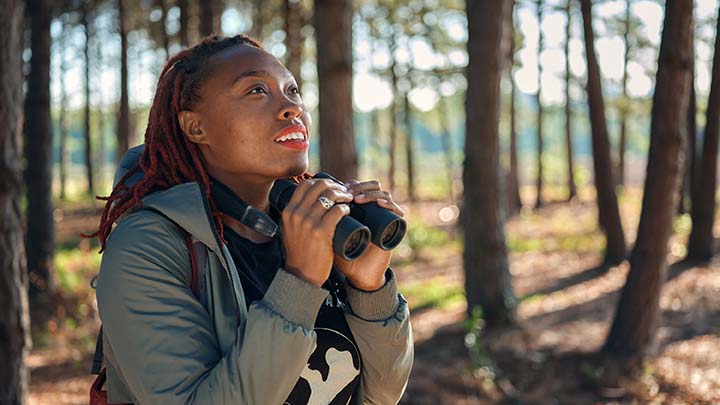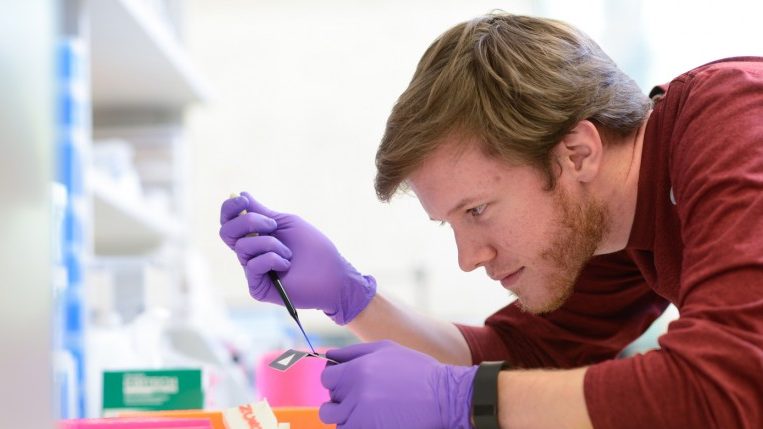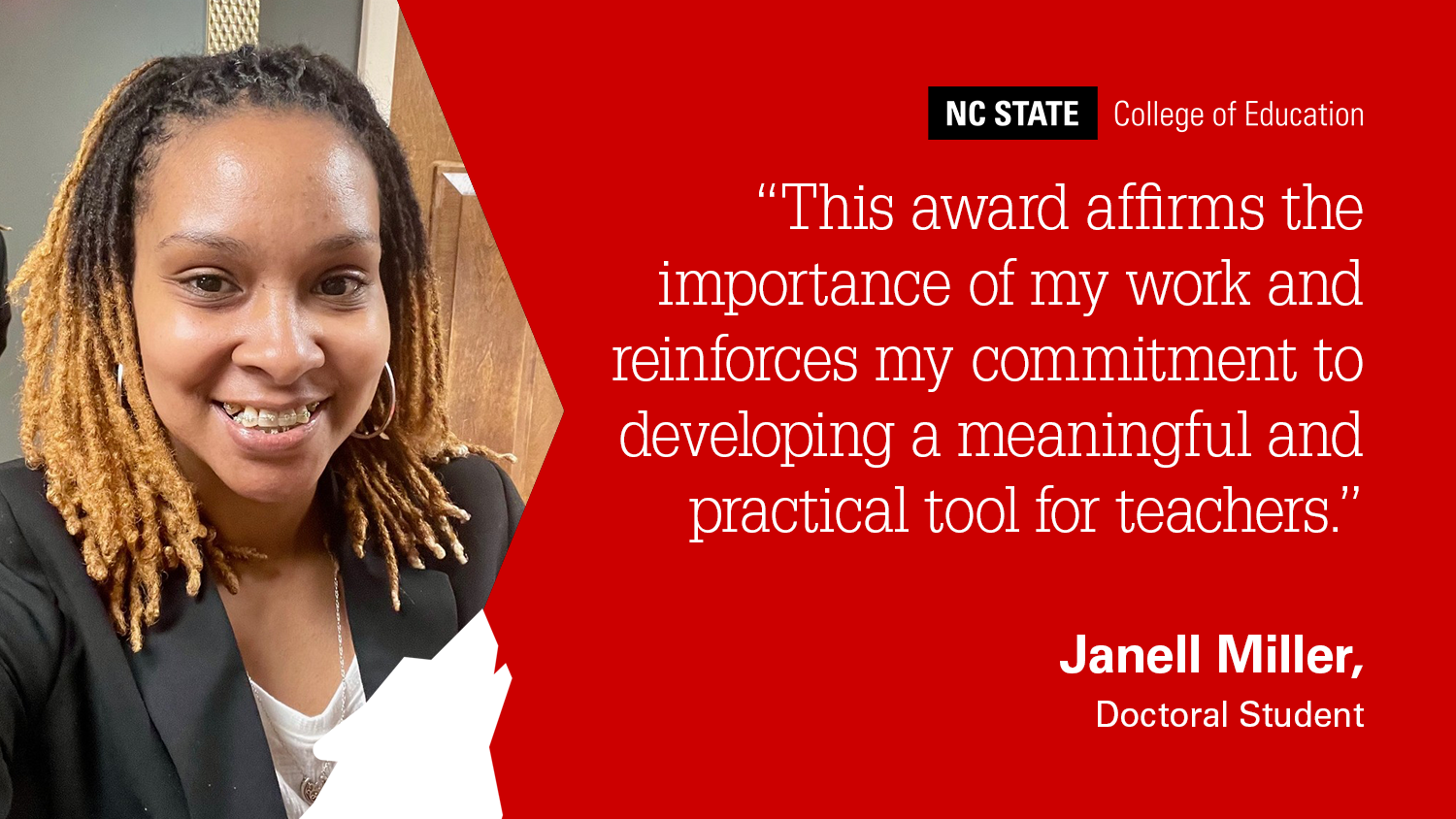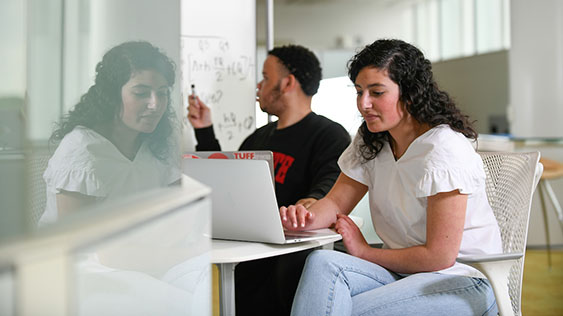Deja Perkins Recognized as One of North Carolina’s Black STEM Leaders
Perkins, a Ph.D. student studying geospatial analytics at the NC State College of Natural Resources, is co-organizer of #BlackBirdersWeek and the BlackAFinSTEM Collective.

Deja Perkins, a Ph.D. student at NC State, was recently recognized by North Carolina Gov. Roy Cooper for her work to advance diversity and inclusion in science, technology, engineering and math (STEM).
“North Carolina is a stronger state thanks to the contributions of many talented Black leaders, including those who work in STEM fields and who deserve recognition,” Cooper said. “As we celebrate their achievements, we must also work to break down barriers and recruit the next generation of leaders by ensuring everyone has access to a sound, basic education.”
In 2020, Perkins helped to launch #BlackBirdersWeek, a social media movement that aims to highlight Black bird watchers, naturalists and outdoor enthusiasts. She also co-founded the BlackAFinSTEM Collective, which “seeks to support, uplift, and amplify Black STEM professionals in natural resources and the environment through professional development, career connection, and community engagement.”
“I believe that sharing nature and science through social media helps reach a broader and more diverse audience, as well as normalizes science to communities outside of academia,” Perkins said. “I use my social media to showcase that STEM is broader than just math, engineering, medicine and the “hard sciences,” and that scientists are more than just old white men in lab coats. I hope that through my profile I can show that the natural sciences and STEM is a valid career option for other Black inner-city youth.”
In 2018, Perkins graduated with a bachelor’s degree in environmental science, natural resources and plant sciences. She then earned a master’s degree in fisheries, wildlife and conservation biology in 2020. From 2018 to 2019, Perkins was supported by the NC State Provost Fellowship and named a Global Change Fellow for the Southeast Climate Adaptation Science Center.
After graduating with a master’s degree, Perkins was hired as the manager of a nationwide citizen science project called Crowd the Tap. Through Crowd the Tap, she provided tap water testing for communities across North Carolina and created a research course to train the project’s student ambassadors in community engagement, science communication and data visualization.
Today, Perkins is pursuing her Ph.D. in geospatial analytics at NC State’s College of Natural Resources, where she is using geospatial tools to investigate gaps in environmental datasets, specifically, volunteer contributed datasets known as citizen science. Perkins is currently investigating the relationship between income and patterns of data collection in urban areas.
We recently spoke with Perkins about #BlackBirdersWeek and BlackAFinSTEM, her interest in birding, and what her future looks like after NC State. Check it out below.
What inspired you to start #BlackBirdersWeek?
The idea behind #BlackBirdersWeek was started by Anna Gifty Opoku-Agyeman and more than 30 organizers in #BlackAFinSTEM after Christian Cooper, a Black bird watcher and board member of NYC Audubon, was threatened with police violence after informing a white woman that she had her dog off-leash in a wildlife protected area of Central Park called ‘The Ramble.’
The idea was initially to raise awareness, not only of the incident but that Black people are and can be voices of authority in outdoor spaces. We exist in this space as ornithologists, researchers, managers, educators, naturalists, outdoor enthusiasts and more. As a group of young Black STEM professionals, we knew the experiences of Christian Cooper were not an isolated incident, and many of us had our own similar stories.
#BlackBirdersWeek started as a social media movement/campaign. It was our version of activism and bringing awareness to the unique shared experience of Black people working in ornithology and the outdoor field in general. Since its initiation, #BlackBirdersWeek has transformed to become not only a virtual space for connection, discussion and healing, but a space for learning and a celebration of Black joy in the outdoors.
I am really proud of the work we were able to accomplish with #BlackBirdersWeek2021 and that I was able to incorporate community bird watching through a partnership with Cornell Lab of Ornithology and eBird, to not only expose people to birding but also increase our bird observations/data collection in minority neighborhoods. As a researcher who studies data gaps in large-scale participatory datasets like eBird, and their environmental justice implications, I was very proud to connect my research to community action and engagement through a platform like #BlackBirdersWeek2021.
How did you initially become interested in birding?
I became interested in birds after volunteering with the Auburn Raptor Rehabilitation Center. I was an education intern, working with owls, hawks and eagles, training them to fly at educational programs and football games. After working with these aerial predators up close, I fell in love with birds of prey.
My interest in birds of prey led me to a summer internship in visitor services at Minnesota Valley National Wildlife Refuge. I was ecstatic to spend my summer on a refuge and was excited for all the potential wildlife encounters. Every day felt like a scavenger hunt for what animals I could find on the refuge, but birds were the only animals that were always there. I was able to see birds at the feeders, sandhill cranes in the wetlands, and eagles flying overhead multiple times a day. I would spend hours at the bird feeder observation window familiarizing myself with the birds to better engage the refuge visitors. Growing up in Chicago, I had never seen so many different and colorful bird species up close, so Minnesota Valley NWR was the place that sparked my interest.
It wasn’t until I started working with the Triangle Bird Count during my master’s at NC State that I developed a love for birding in urban spaces. I am always listening and looking for who’s around, and the species can change every day, from neighborhood to neighborhood, so it’s really cool to see the impact that people have on birds through birding in different neighborhoods.
How did #BlackAFinSTEM come about and how have you been involved in its growth?
After the first #BlackBirdersWeek, I helped to guide a small group of like-minded individuals to form the nonprofit BlackAFinSTEM. Some of us saw an opportunity for the level of impact we could make in our community as a group. We had similar goals to CARE (Connect, Amplify, Retain and Engage Black people in STEM), but more importantly, Black people with connections to the outdoors. When people think about STEM they don’t often think about natural resources and other outdoor sciences, but it is just as valid and important as the other STEM fields. We wanted to highlight that Black people do work in and with nature, and provide a space for connecting, amplifying our work, engaging our community and assisting with developing our members’ various talents.
What has been the impact of #BlackAFinSTEM?
After the initial #BlackBirdersWeek, we saw the creation of various BlackInX weeks. #BlackBirdersWeek inspired other leaders in other fields to call out racism in their own fields and provide similar spaces for connection, amplification, education and opportunity. BlackAFinSTEM set the stage/created the outline for other groups to make an impact.
I have connected with young professionals in various fields who received an abundance of opportunities through the creation of #BlackBirdersWeek and BlackAFinSTEM. BlackAFinSTEM has been able to connect many young professionals with career opportunities such as jobs, paid presentations and industry partnerships.
I am most proud that our group has established partnerships with the Cornell Lab of Ornithology, National Wildlife Federation, The Smithsonian, Bird Collective and many others, to give us a seat at the table creating events “for us, by us,” and giving our members experiences in event planning, maintaining partnerships, hosting panels, giving presentations, getting their artwork on t-shirts and apparel sold nationwide, but most importantly, leadership.
What do you envision for these movements’ futures in terms of advancing diversity and inclusion in STEM?
These initiatives were born during the pandemic, in a virtual space, so I hope that as we return to a more normal and less isolated future, these movements have the ability to adapt and create more in-person opportunities. I would love to see some of the groups born out of #BlackBirdersWeek to have a meetup, similar to a family reunion where people can connect across disciplines, collaborate and have a safe space to be Black and fun in STEM. I hope that these movements will become sustainable and last throughout the years.
What are your future aspirations in the field of natural resources?
After completing my Ph.D., I hope to continue engaging people in nature and science in various ways. Eventually, I would like to open an urban conservation training center so that more people of color can have opportunities to get their foot in the door for ecology, natural resources and conservation. I would like to be a resource for communities who conduct research or want to conduct research and help them visualize and make sense of their data.
This post was originally published in College of Natural Resources News.
- Categories:


